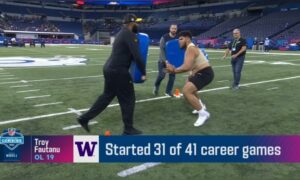Good players find ways to beat you. Great players stay a step ahead and find more ways to beat you when you figure out how to stop the move that was beating you in the first place. It’s all a process that we call self-scouting, an overlooked part of the game—but not by Pittsburgh Steelers outside linebacker Alex Highsmith, who told Steelers.com’s Missi Matthews that he’s spent a lot of time doing just that.
“I’ve gone back and watched so much every game over this offseason”, he said, via the team’s website. “Just studying myself, seeing what works, seeing what didn’t work, and even seeing how guys adjusted to me, adjusted to my moves at the end of the season. Like, ‘How can I continue to get better toward the end of the season to where guys can adjust to me and my rushes?’. Just to continue to get better in that way, it’s a lot of self-evaluation, and knowing that I can always get better”.
The easiest example to point to is Highsmith’s spin move. While it’s not something that he breaks out frequently, it became a go-to weapon during the 2022 season. Late in the year, however, we observed that opponents were getting a better read on it. They’d seen it on tape often enough to be prepared.
For as much value as he places on the spin move as a go-to block beater, I’m sure Highsmith has spent a lot of time in recent months trying to gameplan about how to counter the manner in which teams have countered it.
It helps to have a well-rounded pass-rush repertoire, which is fortunately something that he does have and had already begun to build when he game into the league. Not every pass rusher understands this and focuses on one or two principal rush styles, but Highsmith has always had an appreciation for the value in having any number of ways to beat a man.
But it’s not just edge rushers who benefit from self-scouting, or even just players. Perhaps nobody is better served from self-scouting than play-callers, whether they are the coordinators or somebody else—or a combination of people.
There might be nothing more damning in the game of football than becoming so predictable that your opponent knows what you’re going to run in unintended ways. Sure, sometimes you don’t care if they know because you know they can’t stop you. But that’s not the day-to-day reality.
Part of self-scouting involved installing tendency breakers, which applies as much for coaches as it does for players. If you can set up the same move, or the same play call, from different points of view, or if you present the same look while doing several different things from it, then you prevent your opponent from being able to safely predict what you’re going to do.








